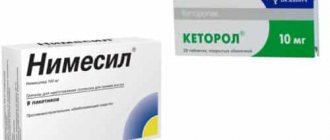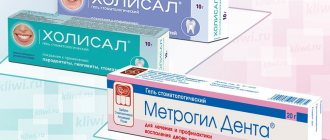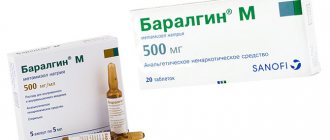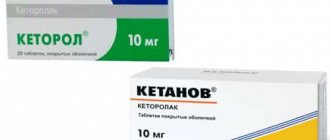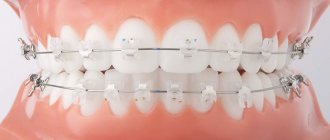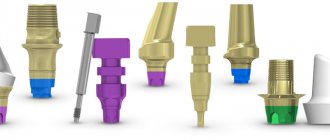Nimesulide
is a drug belonging to the group of non-steroidal anti-inflammatory drugs (sulfonanilide class). The pharmaceutical industry produces it in various dosage forms: for systemic use (powder, tablets, syrup), for topical use (gel, ointment). Nimesulide is a new generation drug that is characterized by high efficiency and safety.
Due to several mechanisms of action, the drug produces the following effect:
- anti-inflammatory;
- antipyretic;
- anesthetic.
In addition, Nimesulide is able to prevent increased blood clotting and the formation of blood clots, suppress the effect of histamine in allergic reactions, and it also has antioxidant properties.
This drug is most often prescribed to relieve symptoms of rheumatological diseases, degenerative-dystrophic lesions of the joints, and inflammation of muscle tissue. It is also used for fevers of various origins, dental, headache, menstrual and other types of pain.
What does Nimesulide help with and indications for use?
Before using the drug, consult a doctor.
It is important to remember that Nimesulide does not affect the causes of diseases and does not treat them. This drug is symptomatic and is used to relieve and alleviate clinical manifestations.
The main indications for taking the drug are:
- Diseases of the musculoskeletal system with severe pain (arthritis of various origins, including rheumatoid, bursitis, tendonitis, osteoarthritis, myalgia).
- Early postoperative period.
- Headache or toothache.
- Periodic pain in women.
Contraindications
The drug is prohibited for gastric and duodenal ulcers, especially in the acute stage, for bleeding disorders and increased bleeding, Crohn's disease, bronchial asthma, inflammatory processes in the intestines, polyposis of the nasal cavity and paranasal sinuses.
Also, the use of Nimesulide is limited in case of individual intolerance to NSAIDs, severe chronic, renal and liver failure, in children under 12 years of age, during pregnancy and lactation.
What can replace Nimesulide?
There are a huge number of drugs on the pharmaceutical market with the main active substance – nimesulide. In fact, these are synonymous drugs that have the same composition and indications. Minor differences may only be in the list of excipients. So, in addition to the drug of the same name, the following drugs based on nimesulide are available:
- Nise;
- Nimesil;
- Nimulid;
- Mesulide;
- Novolid;
- Aponil;
- Flolide;
- Aulin et al.
The listed drugs are available in various forms and dosages, so you can choose the best option for each case. When choosing what is best to use - Nimesulide, Nimesil, Nise or another substitute drug from the above list, you can be guided by the financial availability of these drugs or personal preferences.
In some cases, it becomes necessary to replace Nimesulide with other non-steroidal anti-inflammatory drugs. In this case, the safest drugs are selected, the effects of which are comparable to the effects of Nimesulide. The following analogues of the drug in question are most often used:
- Diclofenac;
- Meloxicam;
- Amtolmetin;
- Indomethacin;
- Diacerein, etc.
It is worth considering that these drugs are also available under different trade names. The choice of an analogue drug should be made only by the attending physician.
Nimesulide or Meloxicam – which is better?
Nimesulide or Ibuprofen – which is better?
Ibuprofen is a widely used non-steroidal anti-inflammatory drug used in the treatment of various rheumatic pains and inflammatory processes in the musculoskeletal system.
It is characterized by good tolerability and effectiveness. However, in comparison with Nimesulide, it is worth noting the more powerful anti-inflammatory properties of the latter.
Ibuprofen is great for menstrual pain by reducing intrauterine pressure and uterine contractions.
Side effects and overdose
Taking Nimesulide in some cases may be accompanied by the development of unwanted side reactions. These include:
- From the side of the central nervous system: dizziness, anxiety, headaches, nightmares.
- Urinary system: decreased amount of urine excreted, hematuria, exacerbation of chronic renal failure.
- From the gastrointestinal tract: dyspeptic syndrome (nausea, vomiting, stool disorders), abdominal pain, flatulence, bleeding, gastritis, ulcerative lesions, jaundice as a result of cholestasis, increased transaminases.
- Skin: increased sweating and allergic reactions of varying severity (itching, urticaria, swelling, Stevens-Johnson syndrome).
- From the cardiovascular system: hypotension, increased heart rate.
- Hematopoietic organs: anemia, pancytopenia, increased clotting time.
- Respiratory system: shortness of breath, spasm of smooth muscles in the bronchi, exacerbation of COPD or bronchial asthma.
- Organ of vision: blurred perception.
Symptoms of overdose are similar to those of adverse reactions. They develop due to non-compliance with doctor’s instructions and uncontrolled use of Nimesulide.
In case of overdose, it is necessary to discontinue the drug, lavage the stomach to clean water and take activated carbon at the rate of 1 tablet per 10 kg of body weight.
Nimesil or Nurofen: which is better, compatibility and differences
At the first manifestations of colds and flu, it is necessary to select special medications whose targeted action alleviates the general condition of the patient.
The most popular antipyretic and analgesic medications are Nimesil and Nurofen. Both drugs belong to the group of non-steroidal drugs.
Before choosing a medicine from the two presented remedies, it is important to understand which is better - Nimesil or Nurofen.
Composition and indications for use of Nurofen
The drug is an analgesic drug with pronounced anti-inflammatory, antipyretic and analgesic properties.
It has several forms of release, each of which is intended for a specific age. All dosage forms contain a number of active and additive components.
The active component is ibuprofen, the content of which in 1 tablet does not exceed 100 mg.
Auxiliary elements include:
- primelose;
- sodium dedocyl sulfate;
- sodium salt of citric acid;
- octadecanoic acid.
The medication is approved for use for medicinal purposes for the following ailments:
- pain in the head area;
- joint pain;
- rheumatism;
- toothache;
- chills due to colds.
Composition and indications for use of Nimesil
Nimesil is considered a non-steroidal medicinal property, the analgesic properties of which relieve pain in the human body. Available in powder form, easily soluble in liquid. The active element is nimesulide, the content of which in 1 sachet does not exceed 100 mg. Additional elements:
- cetomacrogol;
- sweetener;
- fruit flavor (orange);
- dextrin maltose.
The medication is used for a number of ailments. These include:
- pain in the lumbar region;
- rheumatism;
- painful attacks of a traumatic nature;
- bursitis;
- sprains and dislocations.
Nurofen and Nimesil: differences
Nurofen is a therapeutic substitute for Nimesil and has a number of similar medicinal properties. Both drugs are used at the first manifestations of colds. Nimesil has a number of differences from Nurofen:
- Nurofen does not stop inflammatory processes in the body.
- Medicines contain different active ingredients.
- Nurofen is taken three times a day, Nimesil is taken no more than 2 times a day.
- Absolute contraindications for Nimesil include children.
Interactions
Nimesulide increases the activity of antiplatelet agents and anticoagulants. Concomitant use of this drug with diuretics reduces their effectiveness, which can lead to edema, especially in patients with hypertension and renal failure.
Nimesulide also increases the toxicity of cyclosporine and methotrexate. And its simultaneous use with GCS and serotonin reuptake inhibitors significantly increases the risk of bleeding in the digestive tract.
What is better nimesil or ibuprofen?
Which drug is better - Ibuprofen or Nimesil? Both medications are non-steroidal anti-inflammatory drugs (NSAIDs). In Russia, these medications can be purchased without a prescription. Ibuprofen differs from Nimesil in the active substance (ibuprofen and nimesulide, respectively). Therefore, the drugs are not considered analogues, but are similar in effect.
It is impossible to say which of these drugs is better or worse. Nimesil and Ibuprofen are drugs that suppress the activity of inflammatory mediators. Moreover, when the inflammatory process is stopped, the pain immediately decreases.
But the insidiousness of NSAIDs is that when suppressing inflammatory mediators, the production of secretions from the gastric mucosa, which protects it from the effects of hydrochloric acid, is reduced.
It is for this reason that Nimesil and Ibuprofen should be taken only after meals.
Positive aspects of Nimesil and Ibuprofen
- have a powerful analgesic effect;
- have a strong anti-inflammatory effect;
- reduce temperature;
- used to treat rheumatological disease (like Diclofenac).
Indications for use of drugs
- Rheumatic pathologies – rheumatism, arthritis;
- Injuries, sprains, myositis, tendovaginitis;
- Neuralgia;
- Colic. Medicines Nimesil and Ibuprofen are effective for all types of colic;
- Relief of pain during the rehabilitation period after surgery, as well as toothache and headache;
- Menstrual cycle. Drugs are prescribed to relieve pain not only during menstruation, but also to reduce blood volume. Ibuprofen is especially effective in this case;
- Fever. Nimesil powder and Ibuprofen tablets have antipyretic properties. It is recommended to take them at temperatures above 38°. At this temperature, interferon begins to be produced, which protects against viral infection.
Contraindications
- individual intolerance to components;
- ulcerative lesions of the digestive tract;
- blood and heart diseases
- severe dysfunction of the kidneys and liver.
Side effects
- dizziness;
- flatulence;
- nausea, vomiting, stool disorders.
Due to the impressive list of contraindications and side effects indicated in the instructions for use, one does not get the most pleasant impression of the medications. But this only means that it is necessary to adhere to the correct dosage and not take them without consulting a doctor. Judging by the reviews, the medications are well tolerated if the duration of use and daily dose are not violated.
For example, Nimesil has a much milder and safer effect than Analgin and Aspirin.
The simultaneous use of Nimesil and Ibuprofen with certain medications can lead to bleeding and a decrease in the effectiveness of other medications. You should not take Ibuprofen and Nimesil together with drugs for the treatment of thrombosis. Against this background, gastric and intestinal bleeding may develop.
Constantly monitor physiological indicators while taking lithium drugs with Nimesil and Ibuprofen. This is explained by the fact that medications of the NSAID group retain lithium in the body, which significantly increases its concentration and is toxic to the entire body.
